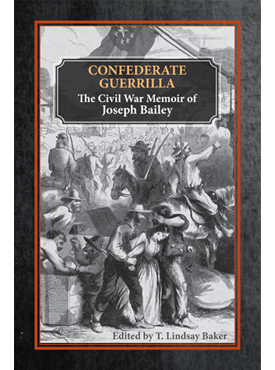Joseph M. Bailey’s memoir, Confederate Guerrilla, provides a unique perspective on the fighting that took place behind Union lines in Federal-occupied northwest Arkansas during and after the Civil War. This story—now published for the first time—will appeal to modern readers interested in the grassroots history of the Trans-Mississippi war. Bailey participated in the Battle of Pea Ridge and the siege of Port Hudson, eventually escaping to northwest Arkansas where he fought as a guerrilla against Federal troops and civilian unionists. After Federal forces gained control of the area, Bailey rejoined the Confederate army and continued in regular service in northeast Texas until the end of the war.
Historians will find the descriptions of military campaigns and the observations on guerrilla war especially valuable. According to Bailey, Southern guerrillas were motivated less by a sense of loyalty to either the Confederate or Union side than by a determination to protect their families and neighbors from the “Mountain Federals.” This partisan war waged between the rebel guerrillas and Southern Unionists was essentially a “struggle for supremacy and revenge.”
Comprehensive annotations are provided by editor T. Lindsay Baker to illuminate the clarity and reliability of Bailey’s late-life memoir.
T. Lindsay Baker is the W. K. Gordon Endowed Chair in Texas Industrial History and the director of the W. K. Gordon Center for Industrial History of Texas, Tarleton State University. He is the author and editor of numerous books, including the award-winning Lighthouses of Texas and the forthcoming American Windmills: An Album of Historic Photographs.
“The Civil War in the West has a single goal: to promote historical writing about the war in the western states and territories. It focuses most particularly on the Trans-Mississippi theater, which consisted of Missouri, Arkansas, Texas, most of Louisiana (west of the Mississippi River), Indian Territory (modern day Oklahoma), and Arizona Territory (two-fifths of modern day Arizona and New Mexico) but encompasses adjacent states, such as Kansas, Tennessee, and Mississippi, that directly influenced the Trans-Mississippi war. It is a wide swath, to be sure, but one too often ignored by historians and, consequently, too little understood and appreciated.
Topically, the series embraces all aspects of the wartime story. Military history in its many guises, from the strategies of generals to the daily lives of common soldiers, forms an important part of that story, but so, too, do the numerous and complex political, economic, social, and diplomatic dimensions of the war. The series also provides a variety of perspectives on these topics. Most importantly, it offers the best in modern scholarship, with thoughtful, challenging monographs.
Secondly, it presents new editions of important books that have gone out of print. And thirdly, it premieres expertly edited correspondence, diaries, reminiscences, and other writings by participants in the war.
It is a formidable challenge, but by focusing on some of the least familiar dimensions of the conflict, The Civil War in the West significantly broadens our understanding of the nation’s most pivotal and dramatic story.”
—Daniel Sutherland, from the preface of I Do Wish This Cruel War Was Over
“Bailey’s story of atrocities, revenge, adventure, escape, and surrender thrilling to read. Civil War buffs, collectors of memoirs, reenactment units, round tables, and Civil War historians interested in guerrilla warfare or the department of the Trans-Mississippi (which included Texas) will find this work useful and informative.”
—James S. Baugess, The Southwestern Historical Quarterly, July 2008
“Civil War scholars will find Bailey’s memoir valuable, because it is one of the few first-hand accounts of guerrilla activities during the war. Most irregular troops refused to write an account of their wartime experiences because they feared that their brutal actions during the war would lead to retribution. T. Lindsey Baker is to b commended for his editing of the original typescript. The memoir is easy to read and follow. Baker also deserves praise for documenting the events mentioned in Bailey’s account with over fifty pages of comprehensive notes.”
—Kenneth W. Howell, The East Texas Historical Journal, July 2008
“…this volume is an expertly done presentation of Arkansas in the war and is heartily recommended for historian and buff alike.”
—William L. Richter, Arkansas Historical Quarterly, Winter 2007
“Bailey’s memoirs offer insight into the relationship of guerilla warfare with military, gender, and social history. His work demonstrates that while these men were sometimes ruthless murderers, they maintained a level of normalcy and sought to defend their homes from what they observed as a foreign intrusion. Bailey’s memoir, most likely written in 1920, is subject to a degree of embellishment, yet it provides an accurate portrayal of the bitter conflict that took place on Arkansas’ home front. Editor T. Lindsay Baker, a Trans-Mississippi scholar, corroborates events using other manuscript sources, which reflect similar occurrences and recollections. He also does a good job of placing the memoir in the larger context of the Civil War with a number of references to surrounding events and participants. Ultimately, Bailey’s memoir describes the Civil War not as a conventional conflict taking place on traditional battlefields, but a bitter struggle between neighbors that engulfed both civilians and soldiers. This memoir, with its references to both the battlefield and the home front, is recommended for those interested in the social and military history of the civil war.”
—Meredith Grant, Military History of the West

